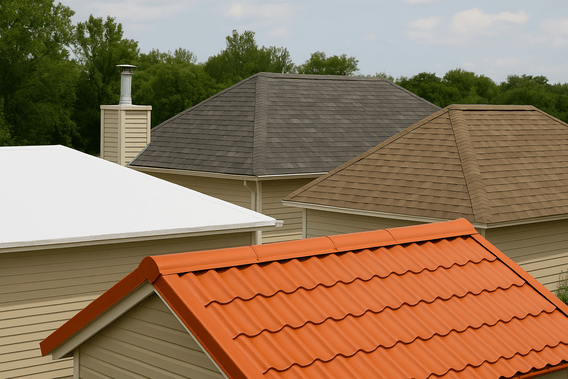
Coatings on roofs help prolong their life, protect them from severe weather, and improve energy efficiency. When considering residential roof coatings or commercial applications, it’s important to think about your roof type, climate, and long-term needs. In this guide on the Pros and Cons of Different Roof Coatings, we’ll provide the roof coating definitions, key benefits, and common defects for each major type—so you can make an informed decision.
Understanding the Pros and Cons of Different Roof Coatings will also help you avoid costly mistakes and choose the right solution for long-term performance.
What does roof coating mean?
Adding a roof coating means applying a protective layer to an existing roof surface. This process enhances waterproofing, increases durability, and shields the roof from UV damage. Roof coating advantages include reducing leaks, lowering heat absorption, and boosting overall energy efficiency in both commercial and residential roof coatings.
1. Acrylic Roof Coatings
Best for: Metal and sloped roofs in sunny or moderate-rainfall areas.
Acrylic roof coatings pros and cons:
Pros:
- Reduce cooling expenses because they are highly reflective.
- Great protection against sun damage and UV rays.
- Affordable compared to other coatings.
- Easy to apply and maintain
Cons:
- Not suitable for ponding water.
- Can fail quicker in extreme climates.
- Often require multiple coats for full protection.
2. Silicone Roof Coatings
Best for: Flat roofs and regions with heavy rain or ponding water.
Advantages:
- Waterproof and resistant to standing water.
- Highly durable for 10 to 20 years.
- Excellent resistance to UV rays and heat reflection.
- No primer is needed; low upkeep is required.
Disadvantages:
- More costly compared to acrylic coatings.
- Over time it may attract dirt and lose .
- Once applied, recoating the surface is problematic.
3. Polyurethane Roof Coatings
Best for: Commercial properties, high-foot-traffic areas, and industrial buildings.
Advantages:
- Highly durable, impact-resistant, and stands up under stress.
- Chemically resistant, making them suitable for industrial use.
- Works on flat and sloped roofs.
- Excellent waterproofing capabilities.
Disadvantages:
- More costly than acrylic and silicone .
- Must be professional .
- May produce unpleasant fumes during application.
4. Asphalt Roof Coatings
Best for: Low-slope and commercial properties.
Pros:
- Inexpensive compared to other options and easily accessible.
- Excellent waterproofing capabilities.
- Functions adequately in colder regions.
Cons:
- Less reflective than other coatings (heat absorbing).
- The material may become brittle with age.
- Greater weight than other coatings, which add more weight to the.
Reasons to Recoat a Roof
Deciding whether to recoat often depends on:
- Roof lifespan: Recoating can add 10–20 years to an existing system.
- Cost savings: Recoating is usually cheaper than full replacement.
- Sustainability: It reduces waste by avoiding unnecessary tear-offs.
These reasons to recoat a roof apply whether you’re looking for commercial or residential roof coatings, making it a cost-effective and eco-friendly solution.
What Roof Coatings Are Best for Your Needs?
When choosing among the Pros and Cons of Different Roof Coatings, consider:
- Climate: Silicone coatings are ideal for areas with frequent rain; acrylic is suited for regions with more sun.
- Budget: Asphalt coatings can be cheaper, but silicone can provide savings in the long run.
- Roof Type: Silicone and polyurethane work best on flat roofs, whereas acrylic is better suited for pitched roofs.
- Durability Requirements: For roofs that experience heavier foot traffic, polyurethane is ideal.
If you’re in Louisiana or Mississippi, consult professionals who specialize in Louisiana roof coatings for tailored guidance.
Roof Coating Advantages Recap
To summarize, here are the key roof coating advantages across all types:
- Extends roof life span and delays costly replacements.
- Improves insulation and lowers energy bills.
- Provides protection against UV rays, leaks, and weather damage.
- Eco-friendly option by reducing construction waste.
Contact Expert Roofing Services at Sunbelt Roofs.
Are you having difficulty selecting an appropriate roof coating? Sunbelt Roofs has qualified roofing contractors in Louisiana and Mississippi to provide expert services for your commercial and residential roofing needs.
📞 985-805-6921 (Louisiana) | 228-222-5255 (Mississippi)
👉 Call Now To Set Up Your Free Roof Inspection!
Conclusions
Pros and Cons of Different Roof Coatings highlight that no single solution works for every building. Acrylic is cost-effective, silicone is perfect for wet climates, polyurethane is tough for industrial use, and asphalt is budget-friendly. By weighing acrylic roof coatings pros and cons, evaluating your climate, and understanding the reasons to recoat a roof, you can make a confident decision.
Ultimately, knowing the Pros and Cons of Different Roof Coatings equips you to balance cost, performance, and long-term protection. For expert advice, long-term solutions, and the best Louisiana roof coatings, reach out to Sunbelt Roofs today.
